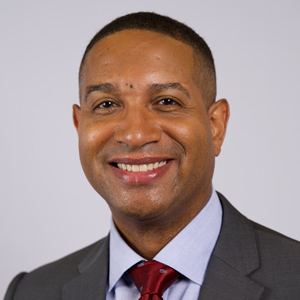
After graduating from Lincoln University, and before enrolling at Medical College of Pennsylvania-Hahnemann University, Romaine Johnson worked for a year as a researcher at the Leonard Davis Institute of Health Economics at the University of Pennsylvania. That experience drove home the fact that research could both make a difference for populations and change individual lives.
“What does ‘research’ mean to someone who’s a first-generation college graduate or first-generation doctor? The image I had was of somebody sitting in a lab with pipettes and chemicals and test tubes,” he says. “What I realized was that research could include studying bigger groups of people and learning how to treat them. I came away wanting to get a master’s degree in public health.” Though he started medical school planning to go into psychiatry, Johnson’s rotations in ENT and surgery made him rethink that aspiration. He went on to a residency in otolaryngology at Baylor College of Medicine and received his advanced training with a pediatric airway fellowship at Cincinnati Children’s Hospital Medical Center — all before obtaining his master’s in public health from Johns Hopkins University in 2008.
Now a professor in the Department of Otolaryngology – Head and Neck Surgery at UT Southwestern Medical Center, Johnson specializes in pediatric aerodigestive disorders, pediatric voice, and pediatric tracheostomy and airway reconstruction. His research interests include vocal cord paralysis, quality improvement, subglottic stenosis, obstructive sleep apnea and airway simulation, but he has also focused on improving population health through the use of biostatistics.
Researching, publishing, teaching and seeing his own clinical patients is an ongoing balancing act, one that Johnson has had to refine over time. “Earlier in my career, I would operate several days in a row because there were so many patients that needed surgery. But you realize as you get older that it’s not the best way, and you need to take time away from the operating room. You can’t produce original research and build programs if you’re in a clinic all the time, so you have to make time for these other pursuits.”
Johnson also finds that the environment in academia has grown increasingly challenging as doctors have less decision-making power than they used to have in most health systems.
“The health care systems are becoming inundated with vice presidents and executives, so we have less chance to be at the table and take on leadership roles.” He notes that the role of mentors in academia remains vital, particularly for those who might come from disadvantaged backgrounds and would not ordinarily be granted that seat at the table without allies advocating for them.
“I have been lucky to have those people in my career. Somebody picking up the phone and saying, ‘Hey, did you hear about this position?’ Or ‘Do you want to come to this meeting? Do you want to give a talk? Do you want to write this paper with me?’ Someone reaching out and offering you ways to help your career and give you that bridge to the next step.”
For his own part, Johnson regularly mentors younger doctors who look to model the career he has built, and he understands that a commitment to academic medicine means paying it forward.
“The future self that I imagined is now actually living, walking, breathing. I’m a full professor in a very prestigious academic institution. I engage in meaningful research in vulnerable populations. I’m able to combine my interests in diversity, equity and inclusion into my practice as well as into my research.”
A fellow of the Triological Society, and a member of the American Academy of Otolaryngology, the American College of Surgeons, the Harry Barnes Medical Society (of which he now serves as president) and the American Society of Pediatric Otolaryngology, among others, Johnson has won multiple awards, including most recently the Distinguished Service Award from the American Academy of Otolaryngology-Head and Neck Surgery in 2022.
Above all, though, Johnson is most gratified by his work with people — those he has helped or been helped by along the way, and the individual patients whose lives he has saved.
“In the end it’s not the awards or publications I’ll look back on,” he says. “It’s the former 24-week preemie who was on a vent, who had a trache, who couldn’t eat, and now they’re graduating from high school. That’s what I will take with me.”